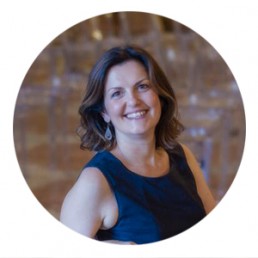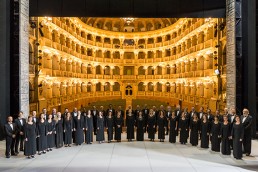MONTEVERDI - ROSSINI - CATALANI - FAURÉ - HAHN
ALBERTO MALAZZI direttore
NICOLETTA MEZZINI pianoforte
The chamber chorus in Italy and France
Born in 1961, he studied piano and composition at the G. Verdi Conservatory in Milan. From 2002 to 2018 he was Choir Master at the Teatro alla Scala in Milan, previously held the role of guest Choir Master at Radio-France, piano accompanist for the Sommerakademie Mozarteum in Salzburg and worked extensively with the Teatro La Fenice in Venice and the Rossini Opera Festival in Pesaro. From 2019 he is Choir Master at the Teatro Comunale di Bologna.
Friday 10 July | H 21.00
Saturday 11 July | H 21.00
Teatro Comunale
With a view to maximizing the protection of its public and in compliance with the indications on the safety spacing contained in the DCPM of 11 June 2020 (art.1 lett. M) The Theater makes available to spectators the following purchase options:
Whole stage 3 seats * | Whole stage 2 seats * | Single stage 1 seat | Poltronissima (stage).
It should also be noted that the positioning of the orchestra will be in the audience behind the stage; therefore stalls are not offered for sale.
The stages are offered for sale only whole and it is not possible to break their purchase. The distance of at least 1 meter is foreseen among the Poltronissime, arranged on the stage.
* The purchase of the entire stage is possible only if the occupying spectators are not subject to the obligations of interpersonal distancing.
Program
CLAUDIO MONTEVERDI
Due cori dall’Orfeo, con la realizzazione del basso continuo al pianoforte di Giacomo Orefice (1909)
GIOACHINO ROSSINI
I gondolieri
La passeggiata
Il carnevale
ALFREDO CATALANI
Extase!
GABRIEL FAURÉ
Cantique de Jean Racine op. 11
Madrigal op. 35
Pavane op. 50
REYNALDO HAHN
da “Douze Rondels”
Le Jour
Gardez le trait de la fenêtre
La Nuit
ComposERS
Claudio Monteverdi (1567-1643) began his musical studies at a very young age, revealing his early maturity at fifteen by publishing a collection of three-part Sacrae Cantiunculae. He aimed to create a musical language that would realize, through the perfect combination of word and music, and with the help of harmony, the truth of expression. On the path traced by the academicians of the Florentine Camerata, creators of the new acting style, he moved towards that reform of the melodrama which constitutes his most authentic glory.
Italian composer born in Pesaro in 1792 and died in Paris in 1868.
His activity has spanned various musical genres but he is remembered above all for the compositions of lyrical works including Il Barbiere di Siviglia, L’Italiana in Algeri, La Cenerentola.
Considered one of the greatest operators in the history of music for earliness and speed of composition, he is also known as the Swan of Pesaro.
Linked to the environments of the Scapigliatura, sensitive to the anxieties and the ferments of renewal that circulated there, the composer Alfredo Catalani (1854-1893) devoted himself mainly to opera music. His works include La Falce (1875), Elda (1880) and Loreley. Catalani intensely felt the moment of transition, and therefore of crisis and unease, crossed by the Italian melodrama between the exhaustion of a tradition and the first affirmations of realism: against this background, his work figures as the extreme jolt an exhausted romanticism .
The production of the French composer Gabriel Fauré (1854-1924) mainly includes chamber music and music for singing and piano. The latter part of its production is made up of a hundred lyrics collected in collections such as Poème d’un jour (1880-1881) and Cinq mèlodies (1892-1893) on Verlaine’s poems.
French composer and conductor Reynaldo Hanh (1875-1947) was a favorite pupil of Massenet at the Paris conservatory, a music critic of the “Figaro” since 1934 and conductor of the Opéra since 1945. Composer with an elegant and light vein, he wrote above all for theater (stage music, operas, operettas and musical comedies) but he also composed symphonic, piano and chamber music, caressing and delicate lyrics (Rondels, Chansons grises, Mélodies retrouvées).
CHORUS OF THE TEATRO COMUNALE DI BOLOGNA
Considered one of the most prestigious ensembles worldwide, through the years the Chorus has been led by Gaetano Riccitelli, Leone Magiera, Fulvio Fogliazza, Fulvio Angius, Piero Monti, Marcello Seminara, Paolo Vero, Lorenzo Fratini, Andrea Faidutti, and, since 2019, Alberto Malazzi. Among its many recordings are those of La Favorita, Macbeth, Manon Lescaut, Rigoletto, La Cenerentola, and Rossini’s Messa Solenne. Its numerous international tours include Amsterdam (1987), Wiesbaden (1994), Japan (1993, 1998, 2002, 2006, 2011, 2017), Savonlinna (2006), Santander (2008), Muscat (2015), Paris (2018). In 2001 the Chorus performed Verdi’s Messa da Requiem at the London Royal Albert Hall within the BBC Proms Festival, with the Royal Philharmonic Orchestra conducted by Daniele Gatti. In June 2019 the Chorus is again touring Japan (Osaka, Tokyo, Yokohama, Fukuoka) with Rigoletto conducted by Alessio Pizzech, and Il Barbiere di Siviglia conducted by Federico Grazzini.
Noteworthy is its return to the Rossini Opera Festival from 2009 to 2016, where in 2011 the Chorus was part of the production of Mosè in Egitto, directed by Graham Vick and conducted by Roberto Abbado, that won the “Abbiati” award as best show for that year.
In 2017 the Chorus was at the Verdi Festival in Parma performing Traviata, and the Stiffelio directed by Graham Vick at the Teatro Farnese that was awarded the “Franco Abbiati” Special Prize.
Its engagements with the Verdi Festival for the Fall of 2019 will see the Chorus perform Luisa Miller at the Chiesa di San Francesco del Prato in Parma, and Aida at the Teatro Verdi in Busseto.
The Teatro Comunale’s 2018 production of La Bohème staged by Graham Vick received the Abbiati Award as best show.








